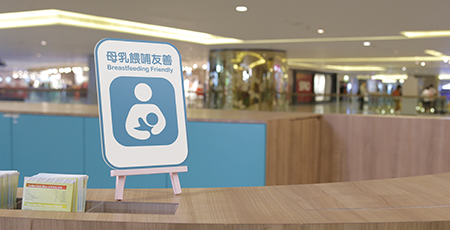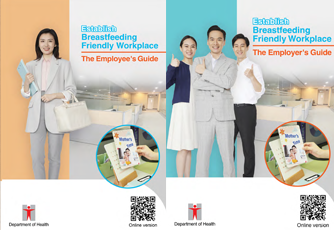Breastfeeding-friendly Community

"Breastfeeding Friendly Premises" is a place where breastfeeding mothers and their families feel welcome and are supported to breastfeed anytime, anywhere. The following are recommended supportive measures to be adopted by staff:
- Respect the mother's freedom to choose where to breastfeed;
- Do not disturb a mother who is breastfeeding, e.g. do not ask her to cover up, stop, or move to another area;
- Offer an appropriate location to a mother who wishes for more privacy to breastfeed, as far as practicable, e.g. a secluded seat that is away from the entrance;
- Be supportive of the needs of breastfeeding mothers and babies, e.g. explain to other customers about the situation.
It is inappropriate to ask mothers to breastfeed their babies in toilets.
Breastfeeding-friendly Workplace
A "Breastfeeding Friendly Workplace" is where an organisation or enterprise provides an enabling and friendly environment for their lactating employees to sustain breastfeeding after they return to work. Specific measures include:
- Lactation Breaks – during an eight-hour shift, allow employee to have two lactation breaks, each about 30 minutes (or one break about an hour), for at least one year after childbirth, and to adopt a flexible approach thereafter;
- A Private Space – arrange lactating employees a private space with a seat, a table and an electric outlet for (operating breast pumps);
- Refrigerating Facilities – provide refrigerating facilities (e.g. a pantry refrigerator) for employees' safe storage of expressed breastmilk.
Expectant employees who plan to breastfeed should discuss with their supervisors early so that preparations in the work setting can be made in advance. Appreciate the understanding from your supervisors and colleagues to support the sustained breastfeeding at work. Work out the plan which is mutually agreed earlier, including the use of lactation breaks, breastmilk expression location and storage facility. At the same time, lactating employees are encouraged to be open-minded and flexibly handle ad-hoc practical issues. Keep good communication with the supervisors and colleagues at all times.

For more details, please refer to the Department of Health webpage.
Source: Department of Health